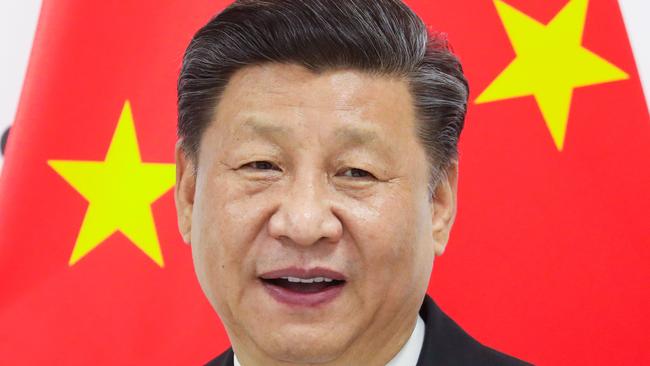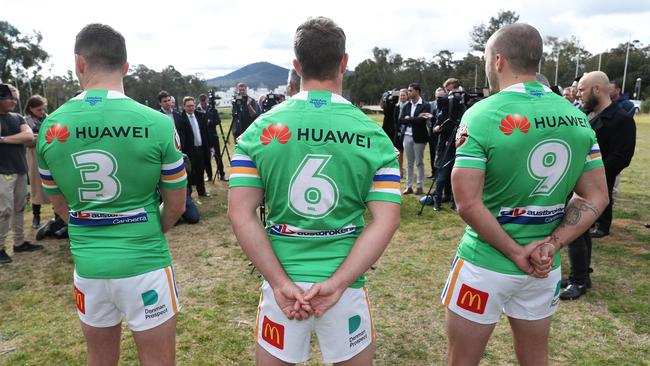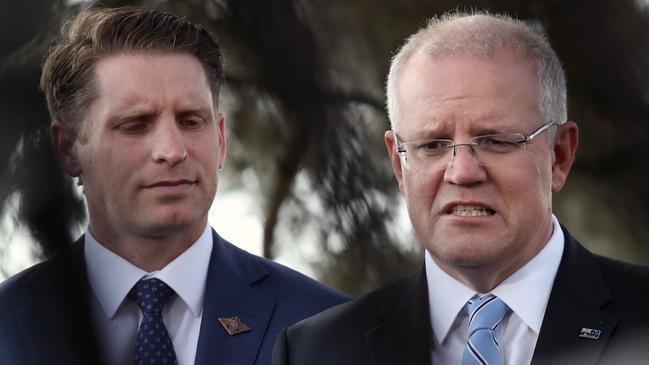China will be Morrison’s greatest leadership test
Though he may not have put it perfectly, MP Andrew Hastie was right when he declared meeting the rise of China to be one of the greatest challenges Australia now faces, writes Renee Viellaris.
Rendezview
Don't miss out on the headlines from Rendezview. Followed categories will be added to My News.
It’s privately talked about when visiting heads of state come to Australia but most of the public are none the wiser.
There are Chinese spies in Australia — probably hundreds. Some are active and some are not. Some mix their legitimate businesses with more nefarious activities.
West Australian MP Andrew Hastie used some sloppy language when speaking out last week about the rise of China, but he is broadly right.
The difficulty for the Morrison Government is that it cannot come out and say it outright because China is a major trading partner.
With one stroke of a pen, China could send Australia into recession.
The complex relationship with China is also why the Government has yet to explain why Huawei cannot — ever — deliver the sensitive aspects of the 5G network. Huawei is desperate to roll out the technology to the world.
Napoleon Bonaparte is quoted as saying, “China is a sleeping giant. Let her sleep, for when she wakes she will move the world.”
RELATED: Trade Minister warns against further outbursts on China
Under President Xi Jinping, China is aggressively and unashamedly pursuing policies that have security agencies on continued alert — for Australia that is China’s interest in the Pacific, its aggression in the South China Sea and its prolific cyber attacks on Australian businesses, agencies and universities. When there are Chinese public holidays, the number of cyber attacks on Australia dramatically decrease.

Former Chinese diplomat Chen Yonglin stunned the public — but not the intelligence community — when he claimed there were more than 1000 Chinese spies in Australia.
“There should be some increase after over 10 years because China is now the wealthiest government in the world, they should have money, they should be [able] to afford raise a huge number of spies here,” he told ABC News in 2005.
He said the spies provided intelligence to Beijing, but in reality it is much more than that.
China and Chinese companies have a network of foreign nationals and Australians that it employs for aboveboard activity. They ingratiate themselves with politicians, universities and business — all generally desperate for donations or work.
Information is currency — especially in China — and these institutions have access to some of Australia’s most sensitive information, including intellectual property and national security matters.
RELATED: China’s global ambition ‘like the rise of Nazi Germany’, Government MP says
The Chinese Government uses a network to spy on Chinese students, it uses its Chinese publications in Australia to push an agenda or use them to lobby for China’s interests.
Chinese companies also use their wealth to influence Australian political policies and others.
Take telecommunication giant Huawei. It’s global sponsorship and corporate poaching is breathtaking.
For the past 15 years Huawei has sponsored the Canberra Raiders (it is no coincidence it sponsors an NRL team based in the nation’s capital). Around the world it also sponsors sporting teams Arsenal FC (UK), AC Milan (Italy), Santa Fe (Colombia) and even the Wellington Phoenix in New Zealand.

In Australia, Huawei has hired specialised staff from the NBN, former US Homeland Security cybersecurity official Donald Purdy, John Suffolk, a former UK Government chief information officer, and former senior British Telecom technology officer Matt Bross.
In Australia, Huawei has been blocked from Australia’s 5G network, which is new radio technology that will be faster and open up extraordinary capability.
It is expected 5G will allow autonomous vehicles to communicate with each other, allow doctors to perform remote surgery and make some law enforcement activities redundant with the use of drones.
Former Australian Signals Directorate director-general Mike Burgess warned how Australia’s future communication system would underpin critical assets, like electricity, sewerage, health and road systems.
RELATED: Hastie’s warning reveals deep divisions over China
“The stakes could not be higher,” Burgess said last year.
“Historically, we have protected the sensitive information and functions at the core of our telecommunications networks by confining our high-risk vendors to the edge of our networks. “But the distinction between core and edge collapses in 5G networks. That means that a potential threat anywhere in the network will be a threat to the whole network.”

Yes, Huawei is a private company but as Attorney-General Christian Porter told Sky News last year, “Chinese corporate structures and relationships with government in China are very different from the relationships of corporate entities to government in Australia”.
In March, New York University law professor and Council on Foreign Relations adjunct senior fellow Jerome Cohen told CNBC, “There is no way Huawei can resist any order from the (People’s Republic of China) Government or the Chinese Communist Party to do its bidding in any context, commercial or otherwise.
“Huawei would have to turn over all requested data and perform whatever other surveillance activities are required,” he said.
MORE FROM RENEE VIELLARIS: Time for Morrison’s policy agenda to get moving
Huawei vehemently denies this — and the other serious allegations levelled at it, including potential violations of US trade sanction on Iran and corporate espionage. In 2017, a US jury awarded T-Mobile US$4.8 million for breach of contract and a year later the Pentagon, worried its soldiers could be spied on, banned the sale of Huawei phones on military bases.
Former SAS soldier and now MP, Andrew Hastie, has more insight into most about China and its activities.
The Government needs to find the right balance to protect its trade interests but at the same time show its own appropriate level of aggression because China does not respect weak states.
Renee Viellaris is the federal politics reporter for the Courier-Mail.
Originally published as China will be Morrison’s greatest leadership test


